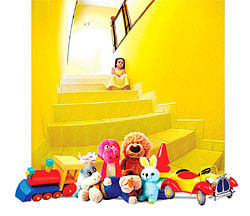
Having beat the rush hour after a week-long sick leave, we reached school unexpectedly early that morning. With all room doors still shut and maintenance staff only just trickling in, there was not much else to do but wait.
The virtually empty school building worsened the heaviness in my eyes as we sat there, just the two of us, my little boy leaning on my knee. It’s been a while since we officially started life in Bangalore and as I fondly watched my munchkin through the fatigue weighing me down into the cold steps outside the classroom, one question repeated itself: “Is there anything I wouldn’t do for my child?”
Again, I looked at his beaming face, now bobbing up and down along the row of floor tiles, when my eye caught the poster on the wall behind him. Boldly calligraphed was: “Many parents are so anxious to give their children what they didn’t have, they often neglect to give them what they did”.
My heart skipped a beat. Was the occurrence of my personal thought and the quote-spotting immediately after, mere coincidence? Or, was it the simultaneous and sudden rumble of students pouring into classrooms and stairwells that startled me? While the bustle shook me out of what could well manifest as Monday morning stupor, a tirade of conflicting emotions and feuding arguments had set to work inside my very tired mind.
That moment passed but those words lingered on in my head along the drive back home. The heavy traffic slowed my commute just enough to sketch out an intense mental process... some people were about to receive a few calls.
I often think about my childhood. Between Dad’s vast army campuses and rich daily life, well-organised holiday travels and the annual Coorg break at Grandma’s, my growing years were a dream. What I had far outweighed what I did not. And what I did not have, I have to crane my memory to remember. What I do remember is this: smiles and grit. Whatever the situation. In trying to give my child all that I did have, I am left astounded at my parents — how did they manage it all?
On the surface, life today is easier than it has ever been before. With the amenities available (some even affordable), the opportunities accessible and information as ample as one’s intellect can take, a dream is the first step to achievement.
While most of our parents, and even some of us, found inspiration in success stories only handed down or splashed across newspapers, our youngsters cross paths with the movers of our times. Sharing a stage with Bill Gates on invitation, shaking the hand of Vladimir Putin on a regular working day or enjoying the chance (and eventually, journey-long) company of our own Narayan Murthy on a routine flight, certainly make great stories. But they are our own stories. And the more we tell them, the more lurks the prospect of another girlfriend recounting her days in college with Dr Manmohan Singh’s daughter (an inspiration in her own right).
As urban professionals, this is the kind of profile we share today — successful, effective, robust and possible as long as there is the dogged will to ‘make it’. If we don’t find it by chance, we seek it consciously. If we can’t secure the one kind, we will grab its image. For us, and eventually for our children.
On the inside, these very advantages come entrenched within a silent moat. The still waters keep a close watch and run deep with expectation. Anything that falls in creates a splash. The waves, however gentle, stir something within the ramparts inside. The pressures only build. And its intensity, we alone, as individuals, will understand.
That is why, while at play, when the frustrated primary-schooler stamped on a newly acquired and obviously expensive electronic console, his parent very sympathetically waited it out. Getting another one of those gadgets was easy — who’s more valuable, the child or the gizmo? In contrast, reasoning with the child would require ‘time’ (this doting parent had just another 45 minutes of bonding time remaining) and winning back his favour after he had been drastically upset, would demand resolute ‘patience’: both premium commodities in corporate lives and understandably scarce in the increasingly dwindling personal.
As a doting parent of the other kind, questions and answers, perspectives and inferences, actions and reactions, events and evidence, transgressed relentlessly in my horrified senses. Did I dare confront that preoccupied parent? No. What business was it of mine, anyway? Well, here’s why it became my business: My child was an attentive witness to all of this. And however subtle its manifestations, none of us is oblivious to the power of negative influence.
So now that I, for no folly of my own, had been left the daunting task of ensuring that my child would never take his blessings for granted, should I have taken it up with the other parent?
After deep consideration, I believe, no. Why? Because I had something she did not — the luxury of time with my child. And my child had something his ill-tempered playmate did not — the security of being with a parent for most of his time away from school. If I had upset my child, I had my choice of days to explain my reprimand and the vices of unacceptable behaviour. I had the option to make it up to him in ‘time’ what the other parent would have to make up for in ‘kind’.
The rampant accusation we face today is that as parents, we are ridiculously ambitious for personal gain. As a result, we are becoming irrevocably indifferent and materialistic. Worse, we are passing this sentiment down to posterity. The usual show-cause validates part of the script on the wall as our permissiveness pans across the wish list, irrespective of what we can provide personally. The full-time maid is always at hand to rub pain off a hurting elbow, the handy chauffeur will procure the last available batch of exclusive cupcakes from an even more exclusive baker and the friendly septuagenarian next door will be only too happy to play chaperone for the first show of Cars 2. We did not have, but we give. We can’t give so we have it given. All demands met, all expectations catered to, satisfaction levels among our youngsters should well be absolute. Right? It seems: Wrong.
So, really, is it true that while providing for our children, we do forget to give them what we had — what they might have only heard of? I think it is a difference of realities. I can vouch for the carefree approach we had to everything back then. Cycling to school was a thrill, a sense of pride. The neighbour’s house was our spare room, literally.
Your Facebook wall still probably carries a status update of drinking water off the garden pipe and surviving it — it also probably carries numerous comments sharing the nostalgia. Those were golden times, where we had what everyone else had. What others did not have, we shared. Everyone around meant something in our scheme of things. I can safely say our wants were simple. Our parents were with us through most of our ordeals.
They did not have to trade an arm or a leg or stent-ridden artery to make us happy.
We came from a conservatism grounded in actuality and reason. What we could not have, we did not have — some showed rationale and others called it strict discipline. But that was enough because opportunities then allowed contentment of this sort. We just did not know what else there was to get. As a society, the combination, I dare say, worked.
But today, the entire universe awaits our enterprise. Chameleon-like perspectives of success and blinding contention have rendered the finish line out of sight. Celebrity endorsements and ‘wish karo’ slogans, though motivational in themselves, personify the attitude of an entire generation that is racing mad. That this race is an unrelenting relay where even batons are designer-ware and every runner carries the dream of the passer, is a truth that gets lost in the frenzy of the very race. Everyone is out there for themselves. There is no time to stop and turn around. There is no time to think, let alone put up with thinking and its resultant tantrums.
It is a time to do. Our children are ticks on our goals-sheet and they live our unfulfilled lives. They have all the toys we wanted and all the pastimes we enjoy. In not realising all our dreams, we have already lost time. Now, while we want to hang around to see our children achieving our triumphs, the sand is only sifting.
We are aware only of the quiet ripples closing in. Everyone is disturbed and every corner harbours threat. Our child is not free to roam the streets. We are not free to guide them through it. What we cannot give to our children from our childhood, we attempt to give from our present situation. We cannot create a safer world singlehandedly — we can only keep our children safe in the one we live. If we had the freedom to be, we give our children the freedom to be able to be. So what if a few moments of their happiness are mail-ordered or bought off a shelf? This is the contentment that we can afford to hand down, irrespective of any constraints. Indeed, we do not neglect to give our children what we did have, we give them as much as is possible and whatever aspect of it is applicable.
Maybe I am just consoling myself in thinking so, but the reasoning is rather sound.
Today, we do tend to overprotect our children. But that is in comparison to what was. Of course, too much protection will weaken them. But, in the plethora of opportunities that open several doors today, though we should teach our children integrity and diligence, I am also dismissive of depriving them of any reasonable advantage that we can add to their prospects. Time defines action and we have to recognise the call.
In building their resilience to life, however, and what it can throw back, I tend to agree with the indispensability of personal attention and importance of quality time — like many, I have the good fortune of showering them on my child. But, for how many more of us do individual aspirations and non-negotiable commitments allow this blanket freedom?
Our country did not gain her independence by staying content. We did not become a nuclear power by closing our eyes to progress. We are not a self-reliant generation, today, by staying in. Our children, irrespective of where they come from, dream big because we can go out there and build the launch pads for them.
Yet, the truth facing us is that a lot of our children lack regard for what has been given to them on a platter, that they keep wanting more and cannot endure reality; that as parents we are really not there for them enough, or in the right manner. That’s a tough one for those of us who are doing the most we can. And against such odds, even parents like me (and there are plenty of us), who actively strive to nurture humane and core values in our children and devote maximum time to them, are looking at an equally grim battle ahead.
What’s right is open to judgement. And as adjudicators of our lives abound, our options attract harsher scrutiny. Can what our parents gave us fortify us against this assault?
